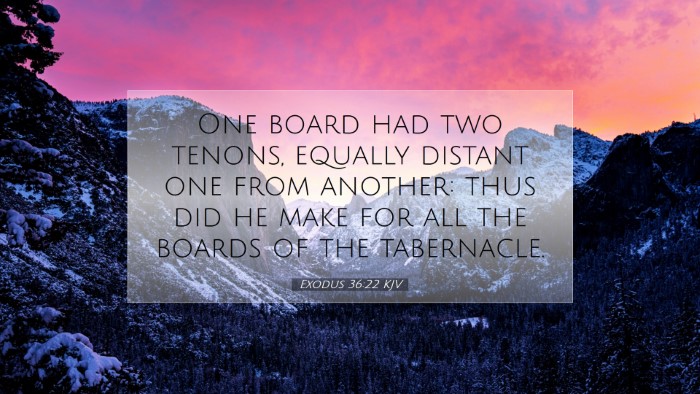Commentary on Exodus 36:22
Exodus 36:22 states: "The rings of the curtain were made of bronze, and the pomegranate pomegranates were made of gold, and they arose upon the pillars of the curtain." This verse is part of the broader description of the construction of the tabernacle and its associated elements. The significance of this verse extends beyond the mere description of construction materials and touches on theological symbolism, divine obedience, and the representation of God's presence.
Overview of Exodus 36
In Exodus 36, we witness the detailed workings of the craftsmen appointed to build the tabernacle. The chapter emphasizes the importance of skilled labor and divine inspiration in the creation of a sacred space. The intricate description of the components of the tabernacle serves to remind us of the sanctity of worship and the meticulous nature of God’s instructions.
The Significance of the Numbers and Materials
In Exodus 36:22, the mention of rings and pomegranates is particularly significant. The bronze rings represent earthly stability and the tangible aspects of worship. In contrast, the gold pomegranates point to the divine glory and beauty associated with the heavenly realms.
-
Bronze Rings:
Bronze often symbolizes judgment and is significant in the context of altar construction (as in the altar of burnt offerings) and various items intended for worship. The use of bronze here indicates stability and security in worship practices.
-
Gold Pomegranates:
Gold is emblematic of divine purity, wealth, and holiness. The pomegranate, being a fruit often associated with abundance, fertility, and life, complements the gold's symbolism, suggesting the prosperity of one's relationship with God.
The Role of Craftsmen
The craftsmen mentioned within this chapter are not merely laborers; their roles signify the divine partnership between God’s vision and human skill. The fact that men with specific skills were chosen to construct the tabernacle reflects God's empowerment of individuals for prestigious purposes.
-
Divine Inspiration:
Exodus 31:6 states that God filled Bezalel and Oholiab with the Spirit of God, granting them wisdom, understanding, and skill in all manner of crafts. This emphasizes that even mundane tasks like construction become sacred when performed in obedience to God's command.
-
Obedience:
The craftsmen obeyed God's command to create a dwelling place for Him among the people of Israel. This serves as a potent reminder for believers today about the importance of obedience and the fulfillment of God's plans through our skills and talents.
Theological Implications
Exodus 36:22, while a meticulous account of materials, carries deep theological implications regarding God’s desire to dwell with His people. It points toward the fascinating duality of God's transcendence and immanence—a God who is both above creation yet chooses to inhabit it.
-
God’s Dwelling Place:
This verse illustrates God's plan to create a sanctuary where He could meet with His people. The covenant relationship established here foreshadows the New Testament understanding of God dwelling with humanity through Christ and ultimately through the Holy Spirit.
-
Symbol of Holiness:
The detailed instructions and the beauty of the materials suggest that God desires a place that reflects His holiness and glory. Just as the tabernacle was an exquisite representation of God’s presence, believers today are called to be vessels of the Holy Spirit and reflect His glory in their lives.
Application for Believers
For pastors and church leaders, Exodus 36:22 serves as a reminder of the importance of creating spaces that honor God, whether physical or spiritual. The preparations taken in building the tabernacle are analogous to the preparation of our hearts and communities for God's presence.
-
Creating Sacred Spaces:
The church should be a place of beauty and holiness, where God's presence is tangible and evident, embodying the principles seen in the construction of the tabernacle.
-
Encouraging Skillful Service:
Encourage members of the church to embrace their God-given talents and use them in service of the community and the church, recognizing that skillful service is an act of worship.
-
The Pursuit of Holiness:
As individuals embody the beauty of God's presence, they are called to pursue holiness in their lives, reflecting the divine through actions that glorify God in every aspect.


